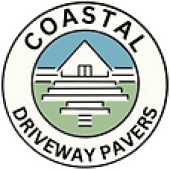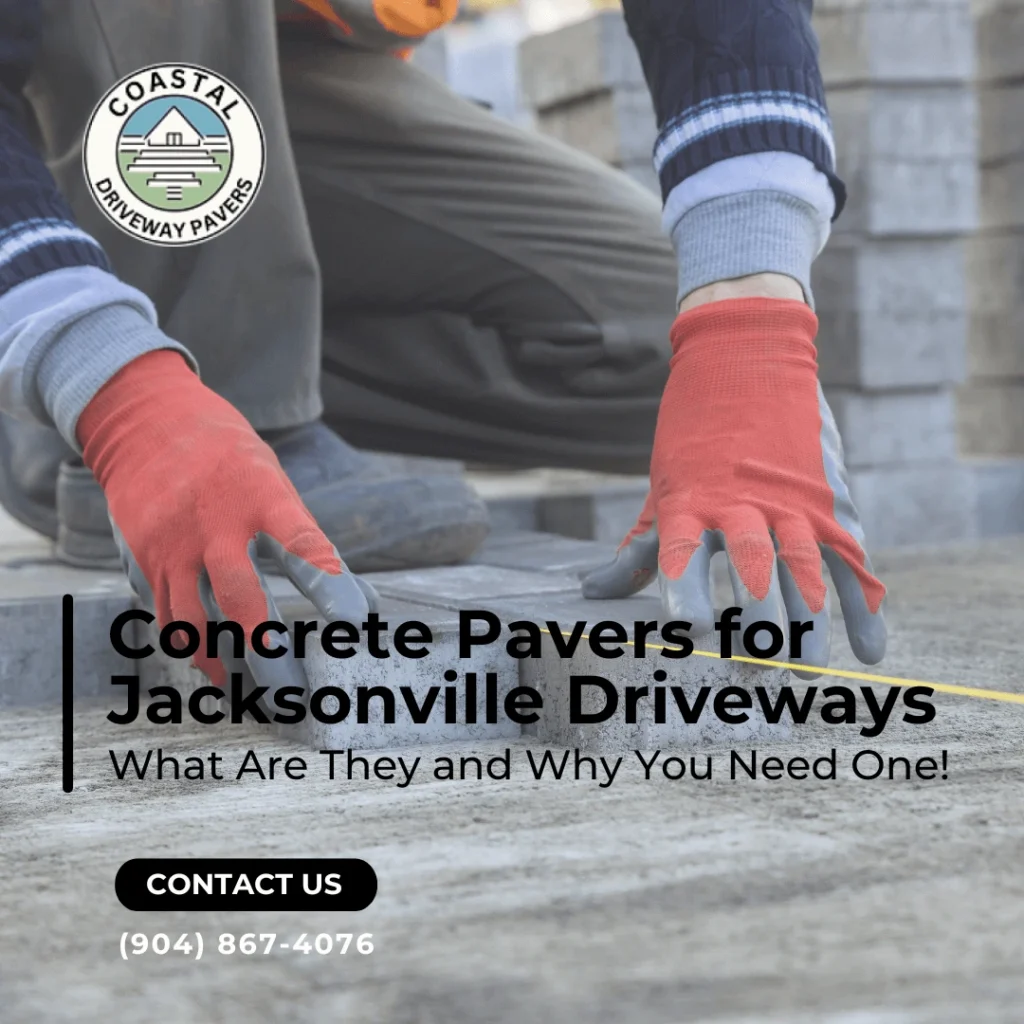Investing in your driveway is investing in your home’s value, and concrete pavers are a surefire way to boost curb appeal and marketability.
For Jacksonville homeowners, concrete pavers is considered a robust and appealing option that can enhance property value.
Keep reading as we break down the reasons why concrete pavers are ideal for your driveway. This blog will also aim to share innovative tips to make a standout outdoor space and driveway that’s hard to beat.
What are Concrete Pavers?
Concrete pavers are pre-cast concrete blocks designed for outdoor living space applications such as driveways, outdoor kitchens, walkways, outdoor patios, and swimming pool decks.
It is commonly made from a mixture of cement, sand, gravel, and water. This mixture is poured into molds to create variety of shapes and sizes and then subjected to intense pressure and vibration to ensure density and strength.
Pigments can be added to the concrete slab mix to create a wide range of colors. Thus, allowing extensive customization. Here are some of the common types of concrete pavers you can find:
- Interlocking Concrete Pavers – These pavers are designed to fit together like pieces of a puzzle.
- Architectural Slab Pavers – Typically thinner than interlocking pavers, with a smooth surface. It is commonly used for pedestrian areas where aesthetic appeal is a priority over load-bearing vehicular traffic.
- Permeable Concrete Pavers – Feature larger gaps between pavers to allow water to seep through. This is ideal for areas prone to water infiltration and to promote better drainage and reduce runoff.
Why Choose Concrete Pavers for Your Jacksonville Driveway?
Climate Suitability
Concrete pavers withstand Jacksonville’s hot summers, mild winters, and heavy rains without cracking or fading. Their ability to expand and contract with temperature changes prevents damage. This ensures your driveway remains in excellent condition year-round.
Cost-Effectiveness
Though initially more expensive, concrete pavers demand minimal maintenance and a long lifespan. This, in turn, makes them cost-effective for most homeowners. They require areas exposed to heavy foot traffic with fewer repairs and replacements over time, saving you money. This makes them a smart investment for your home.
Customizability
Concrete pavers come in a wide variety of color choices, shapes, sizes, and textures. This allows for extensive customization of paved surfaces to match your preferences. They can be arranged in design possibilities to match any pattern aesthetic. This enhances your home’s curb appeal with a personalized touch.
Low Maintenance
Concrete pavers require minimal upkeep, with simple sweeping and occasional washing typically sufficient. If a paver becomes damaged, it can be easily replaced without disturbing the surrounding area. This makes repairs straightforward and hassle-free.
Safety and Eco-Friendliness
Concrete pavers provide excellent traction, reducing the risk of slips and falls, even when wet. Permeable options help manage stormwater by allowing water to pass through and promote groundwater recharge. This supports sustainable landscaping practices and improves safety.
Coastal Driveway Pavers’ Process for Creating Concrete Driveway Pavers
Step 1: Planning and Design
Coastal Driveway Pavers begins by assessing the driveway space and discussing the client’s design preferences.
They help clients choose colors, shapes, and patterns that complement the home’s architecture. A detailed plan is created to guide the project. Thus, ensuring both aesthetic and functional needs are met.
Step 2: Preparation
The team clears the driveway area of any existing materials and debris to ensure it meets the industry standards for installing pavers. They level the ground and lay a solid foundation with a gravel or sand base, This is then compacted for stability. Proper drainage is ensured to prevent water accumulation and extend the driveway’s longevity.
Step 3: Installation and Finishing
Coastal Driveway Pavers installation begins by placing edge restraints, laying the pavers in the chosen pattern, and using a compactor to secure them. Joints are filled with sand or polymeric sand to lock the pavers in place.
Finishing touches are added to enhance the driveway’s overall look. This includes sealant application and optional decorative elements.
5 Concrete Paver Design Ideas to Make Your Driveway Unique
Creating a unique and perfect paver driveway can significantly enhance your home’s curb appeal. Coastal Patio Pavers offers various customization options to help you achieve a distinctive look.
Here are some tips to make your driveway into a true reflection of your personal taste:
- Random Patterns and Shapes: Experiment with herringbone, basket weave, or running bond patterns. Mix different shapes to find the perfect choice for a distinct look.
- Color Variations: Incorporate a mix of colors or use contrasting border pavers for added depth in your exterior space.
- Incorporating Decorative Elements: Add lighting, landscaping, or textured pavers for extra timeless beauty and functionality.
- Eco-friendly Options: Choose permeable pavers to manage stormwater runoff and use recycled materials for sustainability.
- Personal Touches: Include custom engravings or motifs in your paver outdoor design to personalize and enhance the visual appeal of your driveway.
Maintenance Tips for Your Concrete Driveway Pavers
Maintaining your concrete driveway pavers is essential to keep them looking their best. Below are some tips to help you maintain your driveway with minimal effort:
- Regular Sweeping: Sweep the driveway regularly to remove dirt, leaves, and debris that can cause staining or mold growth.
- Occasional Washing: Wash every square foot of the pavers with water and a mild detergent to remove grime and prevent buildup. Use a pressure washer for deep cleaning, but be cautious to avoid damaging the surface.
- Reapply Joint Sand: Periodically check and reapply joint sand to keep the pavers stable and prevent weeds from growing between them.
- Seal the Pavers: Apply a sealant every few years to protect against stains, weather damage, and fading. This also helps to maintain the pavers’ color and appearance.
- Repair Damages Promptly: Inspect the driveway for any cracks or damage and replace individual pavers as needed. Prompt repairs prevent minor issues from becoming major problems.
In Conclusion
Concrete driveway pavers offer a durable, customizable, and aesthetically pleasing solution for Jacksonville homeowners. By choosing Coastal Driveway Pavers, you benefit from a professional, comprehensive process that ensures your driveway is both functional and unique.
Choose sustainability in your paver construction project without compromising style. Contact Coastal Driveway Pavers today to schedule your consultation and make a positive impact with your new driveway.
Frequently Asked Questions
Concrete pavers typically range from 2 3/8 inches to 3 1/8 inches in thickness. The standard thickness for most residential driveway applications is around 2 3/8 inches. This provides adequate durability and support for vehicle traffic. Thicker pavers, such as those over 3 inches, are often used for commercial applications or areas with heavy-duty traffic.
Yes, concrete pavers are known for their durability and can last for decades with proper maintenance. They are designed to withstand heavy loads and harsh weather conditions without cracking or fading. Regular maintenance, such as cleaning and reapplying joint sand, can further extend their lifespan.
Yes, pavers are generally stronger than standard concrete due to their higher density. It also comes with an interlocking system that distributes weight and pressure effectively. This makes them more resistant to cracking and damage under heavy loads.
The material between concrete pavers is typically joint sand or polymeric sand. Joint sand fills the gaps between pavers, providing stability and preventing weed growth. Polymeric sand, when activated with water, hardens to lock the pavers in place and resist erosion.
Yes, concrete pavers can get hot, especially in direct sunlight. They tend to absorb and retain heat, making the surface warm to the touch. Choosing lighter colors and considering shaded areas can help mitigate heat absorption.
Yes, concrete pavers need gaps to allow for proper installation and flexibility. The gaps are filled with sand or polymeric sand, which helps keep the pavers in place and prevents shifting. These gaps also accommodate expansion and contraction due to temperature changes. As a result, it prevents possible cracks and damage. This goes the same with natural stone pavers, travertine pavers and brick pavers.

Written By:









